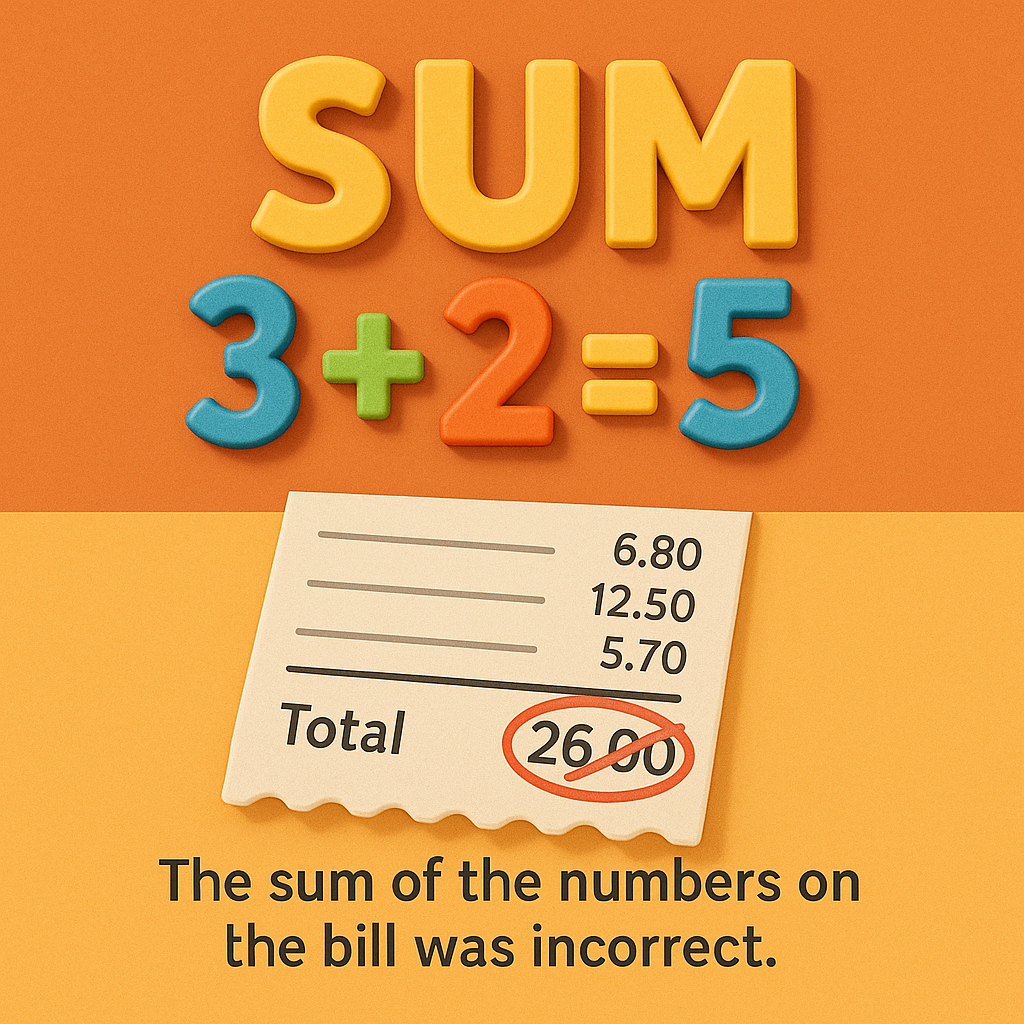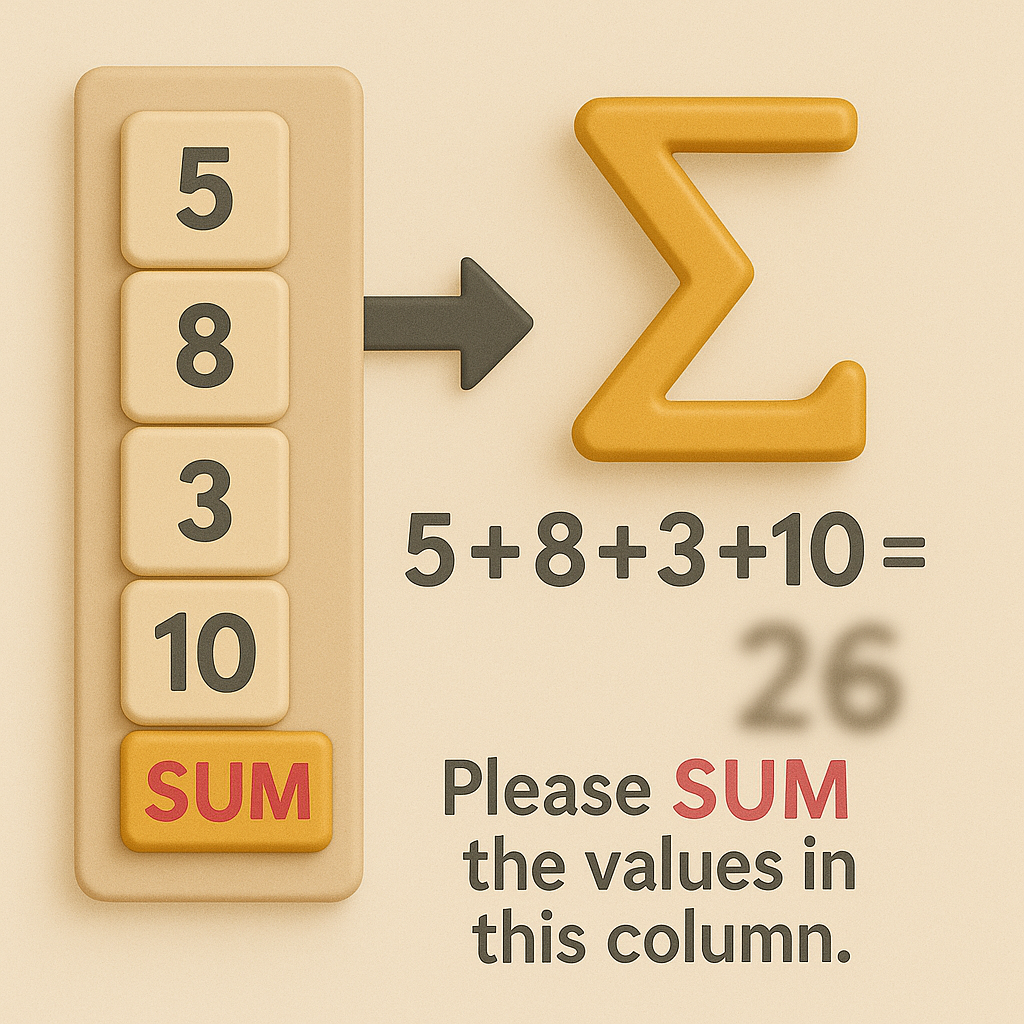Sum
Definition
Sum is a noun and a verb. As a noun, it refers to the total amount resulting from the addition of two or more numbers, quantities, or items. As a verb, it means to calculate the total amount of something.
Parts of Speech
- Noun
- Verb
Pronunciation
American English
- IPA Pronunciation: /sʌm/
- Respelling: SUM
British English
- IPA Pronunciation: /sʌm/
- Respelling: SUM
Etymology
The word "sum" originates from the Latin "summa," meaning "total or highest," derived from "summus," meaning "highest."
Derivatives
- Summation (noun)
- Summary (noun)
- Summing (verb)
- Summative (adjective)
- Oversum (noun)
Synonyms
- Total
- Aggregate
- Amount
Antonyms
- Difference
- Deduction
- None
Usage
The term "sum" is widely used in mathematics, accounting, and everyday contexts to describe totals or calculations. Examples include "The sum of 5 and 10 is 15" and "Let’s sum up our findings in the report."
Related Terms
- Addition: The process of finding the total of two or more numbers.
- Arithmetic: A branch of mathematics dealing with numbers and calculations.
- Total: The final amount after additions.
Detailed Definitions
Noun
- The total of two or more numbers or quantities: The result of adding values together.
- Example: "The sum of the numbers on the bill was incorrect."
- An amount of money: Refers to a specified total of money.
- Example: "She donated a large sum to charity."
Verb
- To calculate the total: The act of adding quantities together.
- Example: "Please sum the values in this column."
- To summarize: To provide a concise statement or conclusion.
- Example: "He summed up the meeting by outlining key points."
sum



🇨🇳 Mandarin
- 总数 (total, sum)
- IPA: /tsʊŋ ʂʊ/
- Respelling: zong shu
- 求和 (the act of summing)
- IPA: /tɕʰjoʊ xwo/
- Respelling: qiu he
🇮🇳 Hindi
- योगफल (sum, total)
- IPA: /jogphəl/
- Respelling: yogphal
- जोड़ना (to add, sum)
- IPA: /d͡ʒoɽnaː/
- Respelling: jodna
🇪🇸 Spanish
- suma (sum)
- IPA: /ˈsuma/
- Respelling: soo-mah
- total (total, sum)
- IPA: /toˈtal/
- Respelling: toh-tahl
🇫🇷 French
- somme (sum)
- IPA: /sɔm/
- Respelling: som
- total (total, sum)
- IPA: /toˈtal/
- Respelling: toh-tahl
🇸🇦 Modern Standard Arabic
- مجموع (sum)
- IPA: /mæd͡ʒ.muː.ʕ/
- Respelling: majmu'
- إجمالي (total, sum)
- IPA: /iʒ.maː.liː/
- Respelling: ijmaali
🇧🇩 Bengali
- যোগফল (sum)
- IPA: /d͡ʒogphɔl/
- Respelling: jogphol
- মোট (total, sum)
- IPA: /moʈ/
- Respelling: mot
🇷🇺 Russian
- сумма (sum)
- IPA: /ˈsumːə/
- Respelling: 'soom-ma
- итог (total, result which could be interpreted as sum)
- IPA: /ˈitək/
- Respelling: 'ee-tok
🇵🇹 Portuguese
- soma (sum)
- IPA: /ˈsɔmɐ/
- Respelling: 'soh-mah
- total (total, sum)
- IPA: /toˈtaɫ/
- Respelling: toh-tahl
🇮🇩 Indonesian
- jumlah (sum)
- IPA: /ju.ml̩.ah/
- Respelling: joom-lah
- total (total, sum)
- IPA: /to.tal/
- Respelling: toh-tahl
🇩🇪 German
- Summe (sum)
- IPA: /ˈzʊmə/
- Respelling: 'zoom-uh
- Gesamtsumme (total sum)
- IPA: /gə'zamtˌzʊmə/
- Respelling: geh-'zahmt-'zoom-uh
🇯🇵 Japanese
- 合計 (sum)
- IPA: /ɡoːkeː/
- Respelling: gokei
- 総数 (total number, often interpreted as sum)
- IPA: /soːsuː/
- Respelling: sousuu
🇻🇳 Vietnamese
- tổng (sum)
- IPA: /təːŋ˧˧/
- Respelling: tong
- tổng cộng (total sum)
- IPA: /təːŋ˧˧ kəːŋ˧˩/
- Respelling: tong cong
🇰🇷 Korean
- 합계 (sum)
- IPA: /hap̚ɡje̞/
- Respelling: hapgye
- 총합 (total sum)
- IPA: /t͡ɕʰoŋhap̚/
- Respelling: chonghap
🇹🇷 Turkish
- toplam (sum)
- IPA: /toplɑm/
- Respelling: toh-plahm
- genel toplam (general sum, total sum)
- IPA: /geˈnel topˈlɑm/
- Respelling: ge-'nel top-'lahm
🇵🇰 Urdu
- مجموعہ (sum)
- IPA: /mʊd͡ʒmuːʕə/
- Respelling: mujmua
- کل (total, sum)
- IPA: /kul/
- Respelling: kul





